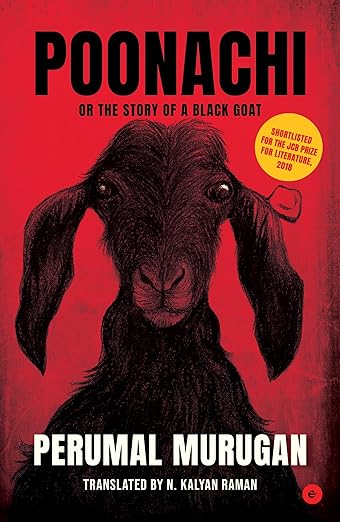
The story of a Black Goat. Story of a Black Goat? Who writes that? Scarcity is the father of innovative story telling. Literally, every man and woman for that matter have been glorified to tell a memorable story. With human characters soon depleting or failing to carve an impression on the writer's mind, the focus shifts to personifying animals, as domestic as goats. Even in animals, the author says, "There are only five species of animals with which I am deeply familiar. Of them, dogs and cats are meant for poetry. It is forbidden to write about cows or pigs. That leaves only goats and sheep. Goats are problem-free, harmless and, above all, energetic. A story needs narrative pace. Therefore, I chose to write about goats." This introduction, comforted me that there won't be any betrayal, injustice or heart wrenching emotions, flooding my heart. Yet, all of this happened but with me not becoming the agony aunt. An individual emerging to empathise with betrayal, injustice and heart wrenching emotions. Poonachi, goes through all this and more. She, too, emerges more resilient, firm and accepting individual than revolting or trying to reboot her system. Adapting to changing circumstances with helplessness and then with self-help, Poonachi is an ideal inspiration. The story of a black goat called Poonachi, is based in a small hamlet in Tamil Nadu. Droughts, famines, poverty engulf, a man and woman, who are rich at heart. So rich that they feed their cattle over their own growling stomachs. The goats are their children while Poonachi is the pampered one for she has no mother to feed her. Poonachi struggles for a mouthful of milk from other nanny goats and from here begin her endless struggles for love, acceptance and progeny. Her teary eyes, docile nature, make her an object of affection for the old woman. The old woman cares for the goat like her own kid. The little miracle who has survived on millet water and just an ounce of milk, is the world for the couple. As you get involved in the story-telling, you unconditionally start loving Poonachi. Her tail, her snout, her leaking udders, talk to you regarding her persona. There is no mushy feeling or 'so cute' extravaganza but definitely there is this extraordinary attachment you feel towards this dumb animal. The story highlights the brutal ways of castration and mating, imposed on animals. The mechanical techniques of breeding for begetting bucks and dose, leaves you empty and vacant. How does a mother feel when her baby is skinned off in front of her weepy eyes? How does a lover feel when her love is beheaded in the centre of her attention? How does a female eager to mate react, when forced with a heavy insensitive body? I don't have to tell you. As humans, animals too are creatures with individualistic desires. Poonachi makes us see, the caste-system, the faith-system, the family-system, the rituals system, in a new light. Light is the word. Poonachi's story lightly tinges your numb fibres, to think, contemplate and then act.
